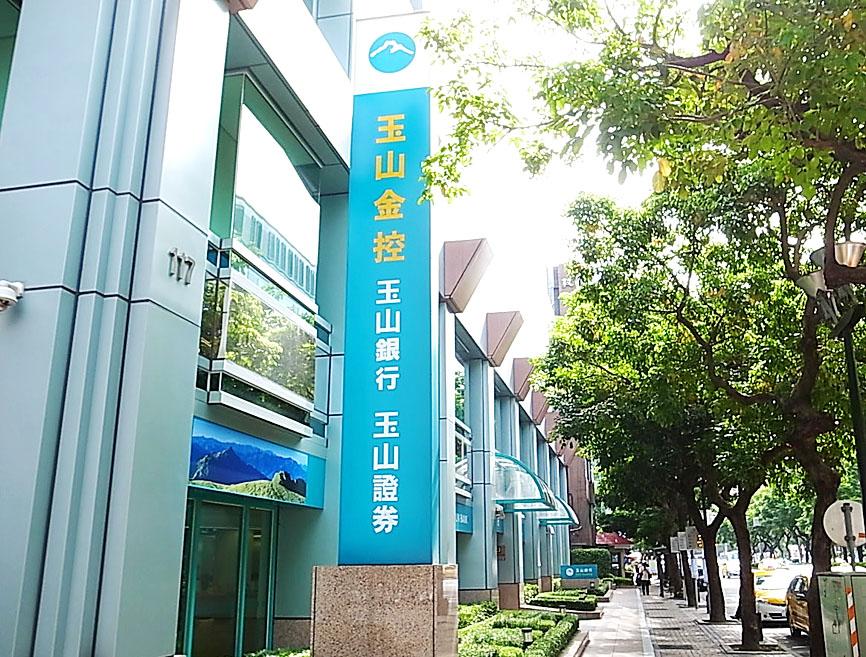E.Sun Financial Holding Co (玉山金控) yesterday said that it would evaluate whether to acquire an insurance company given the challenge of making a profit in a low-interest rate environment and the implementation of new international accounting standards by 2026.
The company has not found good targets to acquire, although local peer Taishin Financial Holding Co (台新金控) last week won a bid for Prudential Life Insurance Co of Taiwan (保德信人壽) for NT$5.5 billion (US$186.33 million).
“The company will keep looking for [suitable targets] ... but we are conservative, as it is challenging to run a life insurance business after a series of rate cuts around the world,” E.Sun Financial president Magi Chen (陳美滿) told an investors’ conference in Taipei.

Photo: Kelson Wang, Taipei Times
Meanwhile, companies with insurance units would be under more pressure financially after International Financial Reporting Standard 17 takes effect, as the new accounting rules have tighter requirements regarding insurers’ capital adequacy, Chen said.
Therefore, for now, it is more important for E.Sun Financial to continue pursuing a steady rise in profit and to keep its capital adequacy at a solid level, although there is still a possibility that the firm could acquire an insurer by 2026, if a qualified target emerges, she said.
E.Sun Financial reported that net profit declined 5.8 percent annually to NT$9.67 billion for the first six months due to less interest income.
Loan-loss provisions gained 60 percent annually to NT$1.6 billion as the company set aside more provisions for mortgages along with a loan default of US$10 million in Singapore.
The company also reported that its operating expenses increased 15.9 percent to NT$16 billion over the period, as there were more marketing activities for its credit cards and more digital investment to improves the bank’s online services, E.Sun Commercial Bank (玉山銀行) chairman Joseph Huang (黃男州) said.
For the first half of this year, net fee income for its credit card operation expanded 6.1 percent year-on-year to NT$3.2 billion, which bucked the trend as many banks saw their fee income decrease amid the COVID-19 pandemic, Huang said.
E.Sun Commercial Bank, which found two of its financial consultants stealing money from clients in the first half of this year, would improve its supervision of financial consultants and rotate their stays in different branches, he said.

In Italy’s storied gold-making hubs, jewelers are reworking their designs to trim gold content as they race to blunt the effect of record prices and appeal to shoppers watching their budgets. Gold prices hit a record high on Thursday, surging near US$5,600 an ounce, more than double a year ago as geopolitical concerns and jitters over trade pushed investors toward the safe-haven asset. The rally is putting undue pressure on small artisans as they face mounting demands from customers, including international brands, to produce cheaper items, from signature pieces to wedding rings, according to interviews with four independent jewelers in Italy’s main

Japanese Prime Minister Sanae Takaichi has talked up the benefits of a weaker yen in a campaign speech, adopting a tone at odds with her finance ministry, which has refused to rule out any options to counter excessive foreign exchange volatility. Takaichi later softened her stance, saying she did not have a preference for the yen’s direction. “People say the weak yen is bad right now, but for export industries, it’s a major opportunity,” Takaichi said on Saturday at a rally for Liberal Democratic Party candidate Daishiro Yamagiwa in Kanagawa Prefecture ahead of a snap election on Sunday. “Whether it’s selling food or

CONCERNS: Tech companies investing in AI businesses that purchase their products have raised questions among investors that they are artificially propping up demand Nvidia Corp chief executive officer Jensen Huang (黃仁勳) on Saturday said that the company would be participating in OpenAI’s latest funding round, describing it as potentially “the largest investment we’ve ever made.” “We will invest a great deal of money,” Huang told reporters while visiting Taipei. “I believe in OpenAI. The work that they do is incredible. They’re one of the most consequential companies of our time.” Huang did not say exactly how much Nvidia might contribute, but described the investment as “huge.” “Let Sam announce how much he’s going to raise — it’s for him to decide,” Huang said, referring to OpenAI

The global server market is expected to grow 12.8 percent annually this year, with artificial intelligence (AI) servers projected to account for 16.5 percent, driven by continued investment in AI infrastructure by major cloud service providers (CSPs), market researcher TrendForce Corp (集邦科技) said yesterday. Global AI server shipments this year are expected to increase 28 percent year-on-year to more than 2.7 million units, driven by sustained demand from CSPs and government sovereign cloud projects, TrendForce analyst Frank Kung (龔明德) told the Taipei Times. Demand for GPU-based AI servers, including Nvidia Corp’s GB and Vera Rubin rack systems, is expected to remain high,